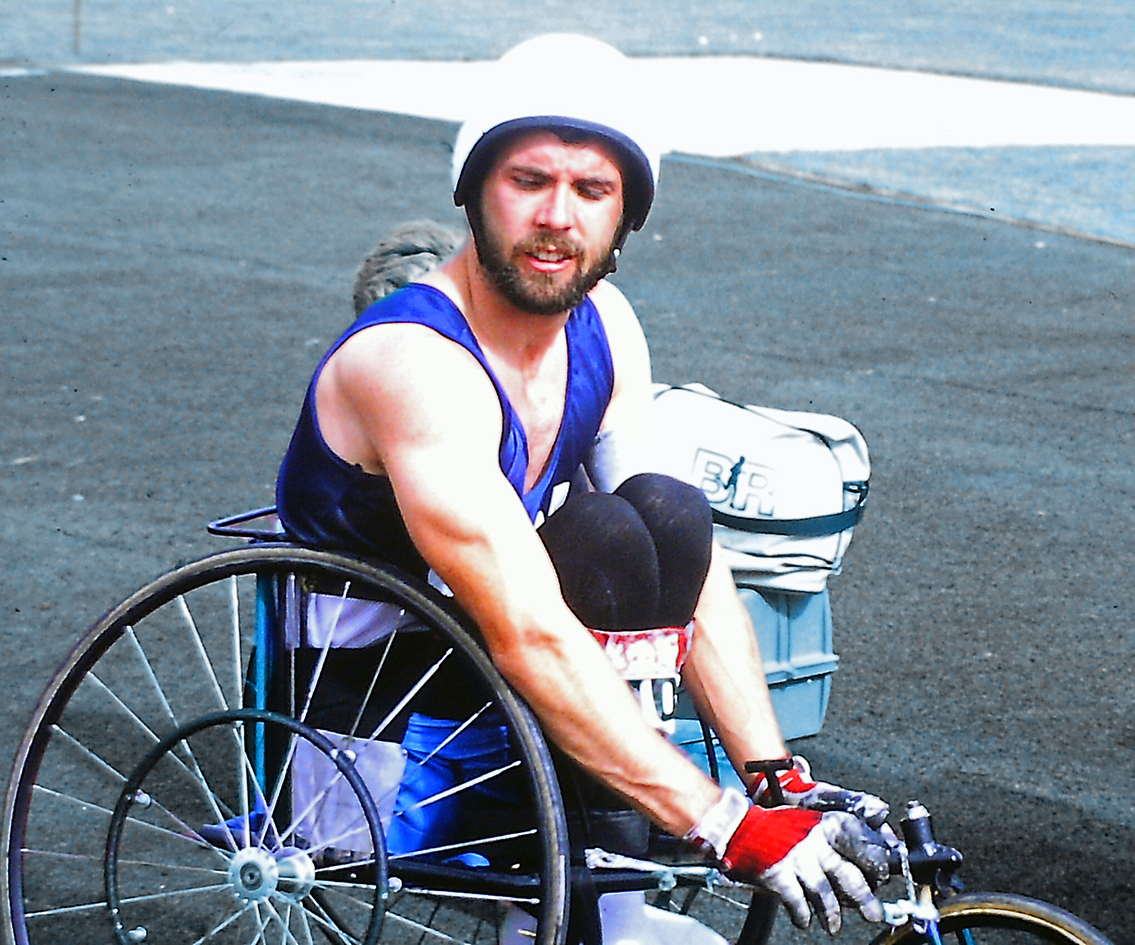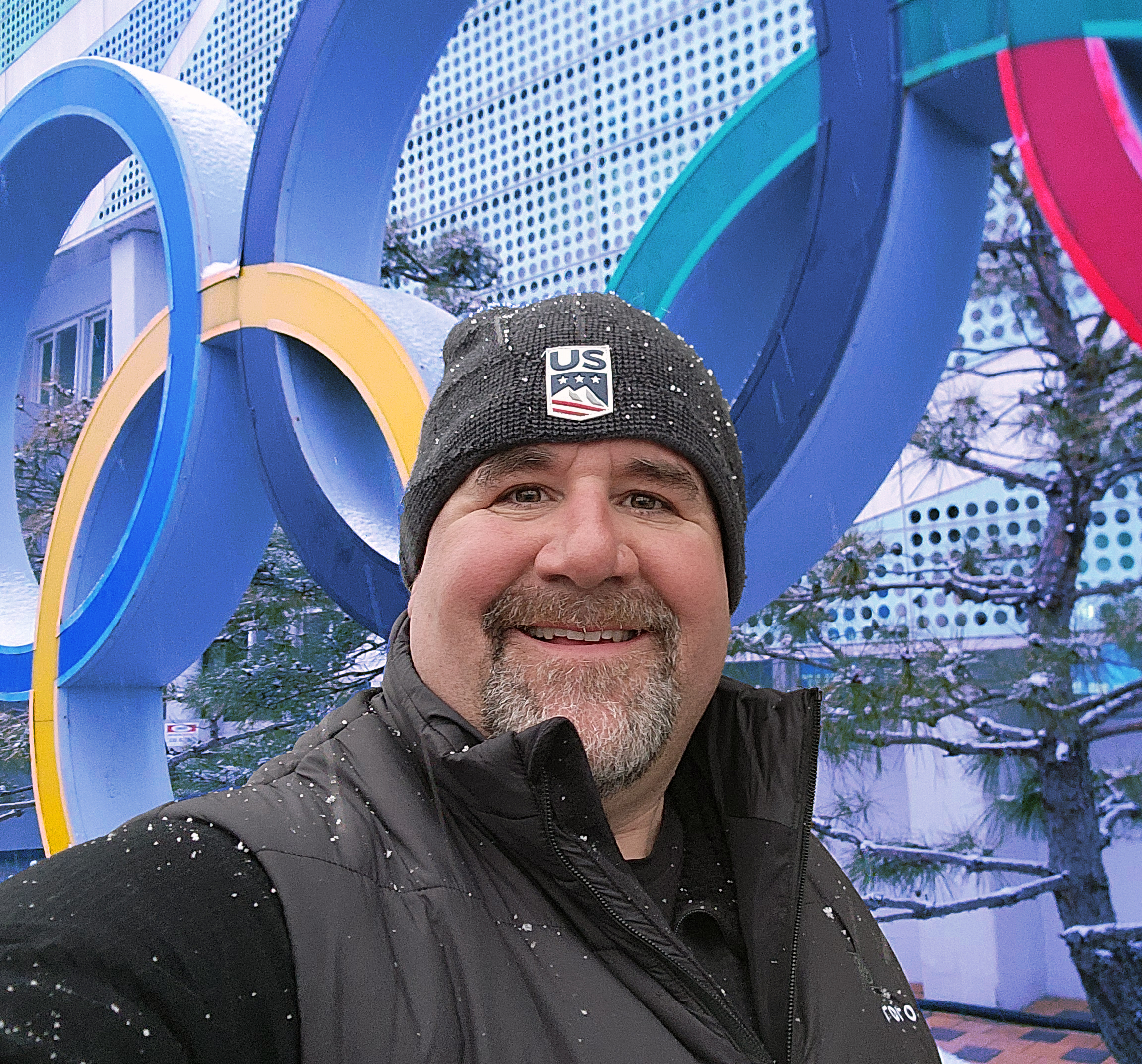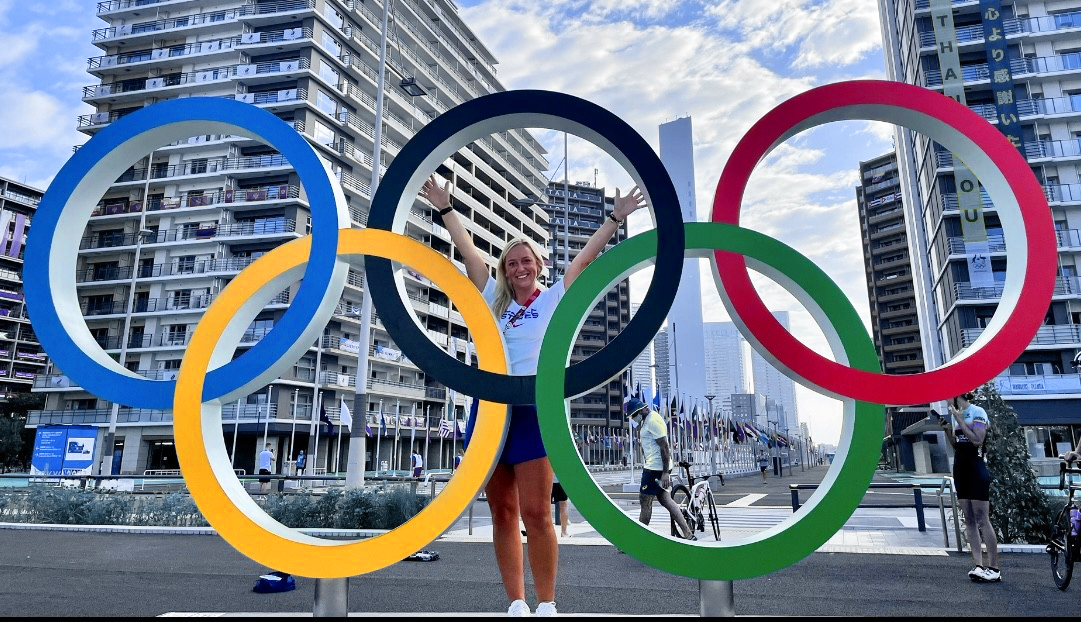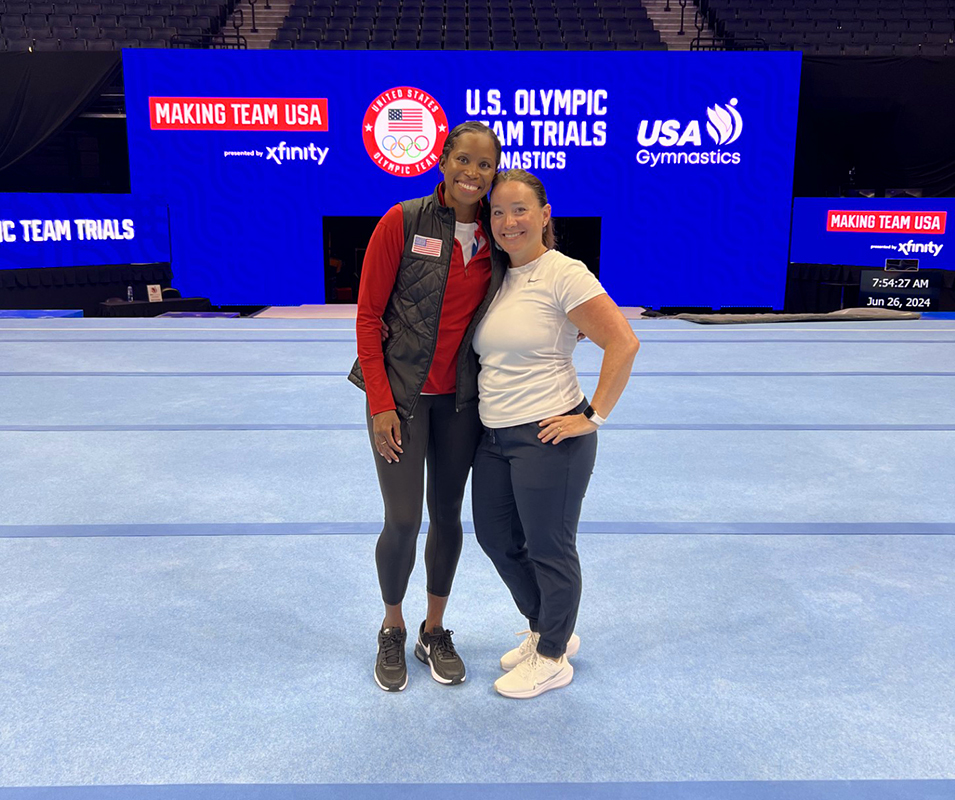
Rory Cooper
As a former Paralympian, what does it mean for you to be selected to this leadership role and what would you like to contribute?
What is one of your fondest memories of participating in the Games?
Will you be going to Paris?
During the Paris 2024 games, which run from July 26 to Aug. 11, Pitt alumni will be working to support athletes across several sports. Some of their stories are spotlighted below.

Ed Strapp
Ed Strapp, an athletic trainer and paramedic, will be supporting Team USA as a medical volunteer.
A state trooper/flight paramedic with the Maryland State Police assigned to the Aviation Division, he graduated from Pitt in 1997 with a Bachelor of Science in exercise and sports medicine with a specialization in athletic training.
“I went to the University of North Carolina at Chapel Hill and got my master's degree in athletic training. Also, while I was at Pitt, my senior year, I took an EMT class and little did I know 20 years later, I'd be full time in EMS. I was full time as an athletic trainer for 15-16 years in high school and college settings and slowly transitioned into EMS full time.”
After becoming a paramedic, Strapp moved to Maryland to fly as a trooper/flight paramedic with the Maryland State Police. “I've always maintained my athletic training and been able to do both,” he said.
How did you get the opportunity to work at the Olympics?
“I have traveled internationally as an athletic trainer with U.S. Ski and Snowboard since 2006. I've been around the world a number of times and been to some amazing places. I'm also a ski patroller. I spent 10 years in Maine, eight years as the head athletic trainer at a ski academy.
“I've done a number of rotations with the United States Olympic and Paralympic Committee (USOPC). That's really how you get your foot in the door is doing volunteer rotations. So I did one out in Colorado Springs and I've done two up in Lake Placid, so that gets your name into their system. I've worked with USA Bobsled/Skeleton and kind of filtered through those areas. And that was part of why I was invited to help Team USA at the upcoming Summer Olympics.”
What will you be doing?
“I will be there as an overall provider for all of Team USA to support any and all of our teams, both clinic coverage and event coverage as well. My day will be very fluid. And I'll be placed in environments where either that team needs particular coverage or that event is a higher-risk event.
“I might be with a team for a couple of days or I might be with them for just one. It all depends on what medical providers they have for their national governing body and how we can help them and assist them.
“Bigger sports have a larger medical component coming with them. Smaller sports will have less support, so we can backfill however we need to.
“We've got probably about 20 providers that will be over, from mental health to physicians to athletic trainers and physical therapists, massage therapists. All of us will be over there to support any of the teams in any way that we can.”
How did your Pitt experience prepare you for your career?
“They always drove us to work to the highest level of our licensure. So, they really challenged us to be really good providers, and they continue to do it in the master's program.
“All of our athletic training education has a strong clinical background.
“When I was at Pitt, I worked with football and men's basketball and baseball and so I really was out in a lot of different environments. They exposed me to a ton of different sports. Rob Blanc, who was the head athletic trainer for years, was also a paramedic. So that sort of spurred me to think about that athletic trainer/emergency medicine component.
“And then the Pitt community is everywhere, so that always helps when you're starting to look for jobs or looking for other opportunities; you find a Pitt connection quite regularly in this setting.”
What are you looking forward to doing at the Olympics?
“We're there to support the athletes and they're in their career-defining moments. So whatever we can do to help them is what our goal is. In sports, it's the pinnacle of all of athletics. They're not the best in the United States anymore. Now, they're the best in the world. And that's their goal. It’s a highly anticipated event.
“And to be the team behind the team is really the exciting part for us.”

Christie-Lee Coad
Christie-Lee Coad, cohead athletic trainer for USA Track and Field, attended Pitt for graduate school from 2008-10, getting her master's degree in sports medicine. She also was a graduate assistant for athletic training, working with swimming and diving.
She worked with USA Track and Field at the 2020 Tokyo Olympics, which were postponed a year because of COVID-19 and held without spectators. “There was an added layer of stress,” because of the pandemic, she said. “Hopefully [it will be] very different this time around in Paris.”
Growing up in the Pittsburgh suburbs, she ran track at Thomas Jefferson High School, which was what pointed her toward her career.
“I actually got sent by my high school athletic trainer to a workshop at Pitt that went over what athletic training was. It was a big sports medicine learning event that they put on for people who are interested in sports medicine.”
With moves that took her through Michigan, Oklahoma, Texas and New Jersey, she initially volunteered with USA Track and Field until she landed a full-time role in 2019.
“They train everywhere, and we compete, literally, all over the world,” Coad said. When we spoke with her in mid-July, she said, “We have groups in Monaco right now and then they go to London and we all meet in Paris, so kind of all over the place, but we see the same athletes a lot throughout the year.”
She and her husband, who also works in professional sports, have a 14-month-old baby, who will not be joining her for the month-long work trip to the Olympics.
What will you do at the Olympics?
“I share the head medical role with one of my former mentors, actually, who got me into USA Track and Field in 2013. So, it’s kind of a cool experience. We’ve been coheads quite a few times now.”
First on her schedule will be working with the relay athletes. “We'll go over early because most of them compete in open events also. But it's not like a relay team in college where they all live and train together. They're competing against each other all year, and now they're going to compete for a gold medal in relay together.”
What do you like about the job?
“Probably my favorite part about working with USA Track and Field is we're pretty multidisciplinary, so we'll have athletic trainers, physical therapists, physicians, chiropractors, sports dietitians, sports psychologists, kind of the whole gamut. The U.S. Olympic and Paralympic Committee has all that and a ton more resources as well.”
She said she expected to be doing a lot of maintenance treatment. “We'll do a lot of activation work and things like that to get them ready for their race. A lot of them have pretty specific routines they do.”
How did your experience at Pitt prepare you for this role?
“Some of my best mentors that I still talk to, to this day, are from Pitt. I remember [longtime athletic trainer] Tony Salesi asked me, ‘What's your ultimate goal?’ And I was like, ‘Well, I really want to do the Olympics, but I know that's kind of far-fetched.’ And he was just like, ‘No, it's not, you can do that.’ And so it was the first time that I was like, ‘Oh, okay, maybe I can do that.’
“People who are my mentors are sending younger athletic trainers now to me, and it's kind of a funny moment where you're like, ‘I looked up to you my whole life and now you're sending younger people back to me.’ I love that about Pitt. I think it truly is a family. I mean, half my family went there.”
What are you most looking forward to at the Olympics?
“To see an athlete that you help come back with a gold medal is pretty awesome. And you're only a very, very tiny part of what went into the Olympic Games being successful, but just knowing that you had a part of that is a pretty exciting feeling.”

Ashley Koto (above right, with Marcia Faustin, one of the women's team physicians)
Ashley Koto
Ashley Koto, who earned a bachelor’s degree in athletic training from Pitt in 2006, is a physical therapist and athletic trainer with USA Gymnastics, spending about two weeks in Paris with the team.
Growing up in Williamsport, Pa., Koto says, “I was a gymnast myself and went in and out of physical therapy a lot. I kind of knew that's where I wanted to go. And I liked the sport side of things. And so somebody had advised me to do the athletic training route, which was the smartest thing I could have ever done because now I get to do the best of both worlds.”
After getting her doctorate in physical therapy at Old Dominion University, she became a sports medicine physical therapist at Children’s Hospital of the King’s Daughters in Chesapeake, Va.
How did you get involved with Team USA?
“My old director at the hospital system I work for accepted a position with USA Gymnastics as their chief of athlete health and wellness. And when they were looking to add somebody to the women's team to help support their physical therapist and athletic trainer, she put my name in the hat. I went out and did some events with them and they liked me. So here I am.”
What will you do at the Olympics?
“Hopefully we're not treating any serious injuries. You know, these high-level athletes always have some sort of ache and pain going on that we help them work through so that it doesn't become something more serious, and then we do a lot of recovery treatment. So just kind of helping their bodies shut down, calm down and prepare for the next practice or competition.”
How did your experience at Pitt prepare you for your career?
“The whole program at Pitt set me up really well as an athletic trainer. We were lucky to have a lot of amazing professors and leaders but also the athletic trainers that we worked under to get the on-the-field experience. My first rotation was in-season football, and you get thrown right into having to do everything. So, I think that just gave me a lot of comfort and experience working with things like on-field management.
“Kevin Conley [chair of the Department of Sports Medicine and Nutrition in the School of Health and Rehabilitation Sciences] was such a huge mentor and just a wonderful human. We're still in contact, and I actually met up with him last year. One of my old classmates from Pitt and I went to one of the football games and got to see him again and catch up on all the things, so he's always been a huge inspiration.”
What are you most looking forward to at the Olympics?
“Seeing the looks on the faces of these athletes and seeing what it's like for them. It truly is amazing, all the work that they put in and finally getting to this stage in their career, and it's fun to watch.”
